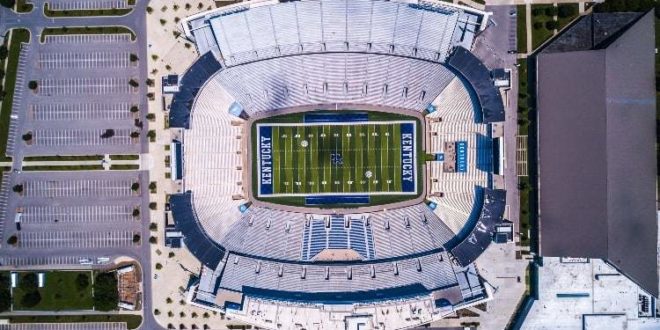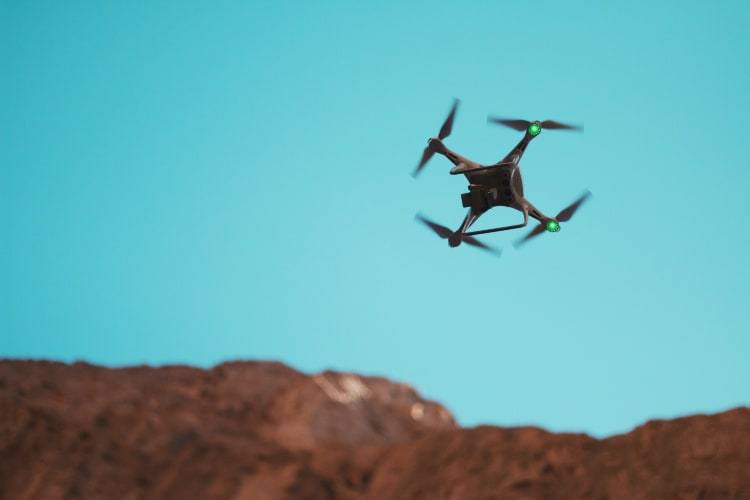In the last few weeks the NFL has been taking the lead in calling for more restrictions on drones to help keep fans safe at sporting events.
Cathy Lanier, the NFL’s Vice President for Security, stated in a testimony given recently before the Senate Homeland Security and Governmental Affairs Committee, that so far in 2018 the NFL has recorded “about a dozen intrusions by drones at stadiums during games.”
In the two years that I have been at the NFL, we have observed a dramatic increase in the number of threats, incidents, and incursions by drones.
– Cathy Lanier, Vice President for Security for the NFL
She went on to observe that the NFL is not alone in these concerns, citing other incidents of rogue drones at sports stadiums and arenas.
The safety concerns related to rogue drones flying over fans at sporting events are twofold. One, that the drone could accidentally fail and fall on fans—as happened over the summer to a woman in Las Vegas celebrating July 4th. And two, that a drone could intentionally be used to transport a bomb, chemical, or some other hazardous substance into an area where a large group of people are gathered.
Roadblocks to Effective Counter UAS (CUAS) at Sporting Events
So why can’t the NFL and other sports leagues just use the CUAS resources that are readily available—things like anti-drone guns, drones with nets, even trained eagles—to keep fans safe?
Because current federal laws don’t allow local law enforcement officials or private citizens to take action against drones, even when they’re being flown illegally.
The current state of the law, however, leaves security officials with an unenviable choice: Procure equipment whose use would be illegal, or remain unequipped to respond to a security threat that could endanger tens of thousands of people.
– Cathy Lanier, Vice President for Security for the NFL
On its surface, the FAA’s reasoning here makes sense. The FAA wants to keep drone laws simple and straightforward, and wants to retain their pre-emptive authority when it comes to who can do what in the skies, which are regulated by federal, not local, laws.
But the truth is that the number of drones in the hands of amateur pilots has grown quickly over the last few years, with safety concerns growing right alongside them. To choose another example, in addition to the number of rogue drones in stadiums cited by the NFL, the number of rogue drones that have impeded firefighting efforts has also steadily risen over the last few years.
So What’s the Solution?
The problem here is not an easy one. Simply opening up drone regulations and CUAS options to localities and private entities could create a free-for-all situation, and entitle those who simply don’t like drones to bring them down whenever and however they like.
Indeed, many states and cities have already passed their own drone laws in defiance of (or perhaps ignorance of) federal law. Even though many of these local drone laws go against FAA regulations, in each instance the law will most likely have to be challenged in court before any real change will take place—this is what happened almost exactly a year ago, when a court in the Newton Case struck down several drone ordinances for being in direct conflict with existing FAA regulations.
The UAS Integration Pilot Program, whose 10 winners were announced back in May, was created in part to help alleviate these tensions between federal and local authorities when it comes to how drones are regulated. And research into UTMs, which has been moving along relatively quickly, considering the complexities involved, could also help by providing systems for identifying rogue drones and possibly even for removing them from the sky.
But for now, these programs and measures are still not actual resources that the NFL and others can use.
In her recent testimony, Ms. Lanier made the following proposals to help with the issue of rogue or “malicious” drones:
- Permit the Attorney General or the Secretary of Homeland Security to delegate drone countermeasure authorities to state and local law enforcement protecting a large sporting event covered by a temporary flight restriction.
- Require the Attorney General and the Secretary of Homeland Security to consult with state and local law enforcement, and incorporate state and local law enforcement personnel into the implementation of drone countermeasure programs.
- Establish a pilot program to include state and local law enforcement personnel in the programs developed pursuant to the legislation.
We find these steps reasonable, and appreciate the call both for immediate action via TFRs but also for collecting more information via a pilot program. As veteran law enforcement officer Travis Moran recently put it in Dronin’ On, praising the level-headed next steps proposed by Ms. Lanier and the NFL: “The knee jerk rarely ends well.”
It will certainly be interesting to see if the NFL’s proposals are put into action, and what will happen next to address the concerns raised by the NFL and others regarding how to deal with the threat posed by rogue drones.
What do you think about the NFL’s CUAS proposals? Join a discussion on this topic in this thread on the UAV Coach Community Forum.
https://uavcoach.com/nfl-cuas/
 Unmanned Aerial Vehicle The latest drone news
Unmanned Aerial Vehicle The latest drone news





